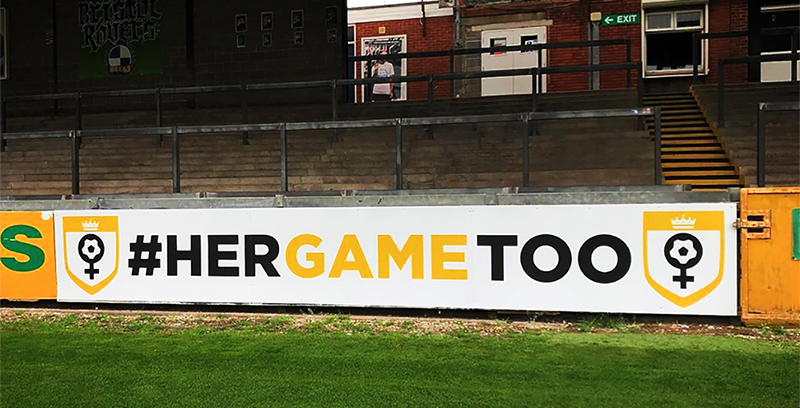
Abuse on social media sparked a group of female fans into action – and their message is gathering pace
January 27 ~ When a group of ardent fans came together a few months ago to launch a campaign to tackle sexism in the game, they had no idea where it might lead. They knew what had sparked them into action and that was the sexist abuse suffered by one of their number after posting a football opinion on Twitter.
Initially cowed by the vitriol, Caz May reached out to fellow Bristol Rovers fan Lucy Ford and they teamed up with ten other female supporters to create Her Game Too. “We just wanted to highlight our experiences and get it out there,” says 25-year-old Ford. “It’s a conversation that needs to be had, but the reaction we got was beyond anything we could have imagined.”
Launching on FA Cup final day with a punchy “pass the paper” style video, the 12 women, kitted out in their respective teams’ shirts, each held up a card displaying comments they had received. From the tired “it’s a man’s game” and “get back to the kitchen” to the intimidating “fancy a shag”, it was a powerful 60 seconds that resonated across the sport. “The response was crazy, the video got one million views in 24 hours on Twitter,” says Ford. “And 95 per cent of it was positive – girls getting in touch saying, ‘thanks and this is my story’, dads showing pictures of their daughters, clubs sharing it.”
Following up with a survey of almost 400 women, they found that 90 per cent had faced some sort of sexism, either at the football, in the pub or online. With one recounting a threat of rape and others having to endure sexually abusive language and physical intimidation at matches, there was clearly a problem, so the campaign reached out to clubs suggesting they partner up.
What’s in it for them? The hope is that by backing Her Game Too, advertising the campaign in grounds, in programmes and on social media, clubs can more easily highlight their own reporting systems or direct fans to the group’s scheme.“It’s saying they want to make their club a safe place for fans,” explains Ford.
And many clubs have responded, with Her Game Too winning the backing of sides across the country, including 25 from the English Football League. Several of those partner clubs have come up with innovative ways to promote a sense of inclusion too. Torquay United recently gave out 1,000 free match tickets to local women and girls, while Forest Green have Her Game Too logos on their women’s kits and pitchside LED boards.
One of the earliest partners, Exeter City, even dedicated an entire weekend to the campaign in mid-October, with both their men and women playing at their St James Park home, all warming up in Her Game Too tops which were later signed to be auctioned off by the campaign in aid of grassroots clubs. “It just seemed the right thing to do, not because we felt it was an issue we’d noticed at Exeter, but to prevent any issues before they happened,” says media officer Craig Bratt. “Often the things said to female supporters are passed off as banter, and the point we wanted to make is, it actually isn’t banter. We want to make female supporters confident enough to react to something being said to them rather than just leaving it be.”
And it seems that more women are reacting, rather than just accepting sexism. According to the Football Supporters’ Association’s recent Women at the Match survey, nearly a quarter of women were willing to laugh off sexism in 2014; half that number would do the same today. But there is still work to be done. That same online survey of 2,164 fans found that one in five women had experienced unwanted physical attention at men’s matches. “The FSA is clear on this,” said FSA board member Ally Simcock when the results were announced. “There is no place whatsoever at football for sexist or misogynistic behaviour.”
As for Her Game Too, they are now a non-profit organisation with a Twitter following of almost 17,000. They sell their own branded gear, ploughing profits back to grassroots clubs, and want to take their message into schools and fans’ trusts, while backing more research as well as women’s involvement in all aspects of the game. “We’re not trying to take over the sport,” adds Ford. “We’re just trying to make it so everyone can enjoy it.” Catherine Etoe
This article first appeared in WSC 417, February 2022. Subscribers get free access to the complete WSC digital archive – you can find out more here.
Want to see your writing published in WSC? Take a look at our pitching guide and get in touch
